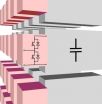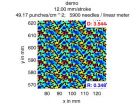(Press-News.org) Breast cancer patients are more likely to have joint pain from taking aromatase inhibitors (AIs) if they have advanced stage cancer, according to a study presented at the American College of Rheumatology's annual meeting, held Nov. 7-11, in Atlanta. The study is one of the first to identify factors that increase the likelihood that a patient will suffer joint pain from AI therapy.
AIs, the standard adjuvant therapy for post-menopausal breast cancer, can cause joint pain in patients, mostly in the hands and wrists. This pain can sometimes be debilitating. "Patients complain bitterly about this pain that they can get in their hands after starting these medications," said Lisa Mandl, M.D., an assistant attending rheumatologist at Hospital for Special Surgery in New York, who was involved with the study. "It is so bad that sometimes patients stop taking AIs, even though we know the drugs are literally life-saving—they decrease the risk of dying from breast cancer." Studies have shown that up to 15% of patients on AIs discontinue their therapy due to pain.
Because few clinical trials have characterized this syndrome, investigators at Hospital for Special Surgery launched a prospective study to shed some light on the condition. "Nobody has really properly described this syndrome or tried to figure out what might predict you getting it," said Dr. Mandl. "What is the pain? Is it joint arthritis? Is it tendonitis? Is it inflammation of the muscle? We wanted to describe it better than it has been described in the literature to date."
The investigators enrolled 35 post-menopausal women with hormone-sensitive, non-metastatic breast cancer who didn't have rheumatic disease. Subjects were evaluated at baseline, at three months, and at six months after starting aromatase inhibitor therapy. They underwent physical exams and filled out questionnaires about quality of life, health status and pain. Patients also underwent magnetic resonance imaging (MRI) scans at baseline, at the point they complained of any pain, and at six months.
"We were trying to detect inflammation and the anatomic location of their symptoms. Was the pain caused by inflammation in the joints or around the tendon, for example?" Dr. Mandl said.
The study classified women who reported new or worsening musculoskeletal symptoms as symptomatic. Of the 35 women enrolled, 19 (54%) were symptomatic and of these 2 (5.7%) discontinued AI therapy. The mean time to onset of symptoms was six weeks, range two to 18, and 58 percent of symptomatic subjects had pain in their hands. Roughly 11 percent had tenderness of tendons in their hand and 14 percent had generalized wrist stiffness.
The investigators found that MRIs were not always abnormal in symptomatic patients, although in some individual patients who experienced pain, doctors could detect abnormalities on their MRIs. There was no evidence of inflammatory arthritis on MRI, but some of the women who complained of pain had tenosynovitis, inflammation of the fluid-filled sheath that surrounds a tendon in the hand.
The investigators did not find any correlation between depression and pain. Other researchers have hypothesized that the syndrome might be caused by an autoimmune condition, but this study showed no association between autoimmune markers in the blood and pain. "I think it's interesting that we didn't find any autoimmune disease predisposition. We thought we might," Dr. Mandl said.
Only one factor predicted whether women had pain—having later stage cancer. "If you have stage II or stage III cancer, you are more likely to have this pain than if you have stage I cancer," Dr. Mandl said. She pointed out that women who had cancer that had metastasized to the bone were excluded from the study, so metastases were not the root of the problem.
"Before this study, we knew some women got this pain. Now we know that it is more likely in patients with later stage cancer and at least some of these women have tenosynovitis but not all," Dr. Mandl said. "We were not able to identify any other predisposing factors."
INFORMATION:
The lead investigator of the study was Ora Singer, M.D., who was at HSS during the study but is now a rheumatologist at the Medical College of Georgia Hospitals and Clinics. Other investigators involved with the study are Alana Levine, M.D., Tessa Cigler, M.D., Anne Moore, M.D., and Huong Do.
About Hospital for Special Surgery
Founded in 1863, Hospital for Special Surgery (HSS) is a world leader in orthopedics, rheumatology and rehabilitation. HSS is nationally ranked No. 1 in orthopedics, No. 3 in rheumatology, No. 16 in neurology and No. 18 in geriatrics by U.S.News & World Report (2010-11), and has received Magnet Recognition for Excellence in Nursing Service from the American Nurses Credentialing Center, and has one of the lowest infection rates in the country. From 2007 to 2011, HSS has been a recipient of the HealthGrades Joint Replacement Excellence Award. A member of the NewYork-Presbyterian Healthcare System and an affiliate of Weill Cornell Medical College, HSS provides orthopedic and rheumatologic patient care at NewYork-Presbyterian Hospital at New York Weill Cornell Medical Center. All Hospital for Special Surgery medical staff are on the faculty of Weill Cornell Medical College. The hospital's research division is internationally recognized as a leader in the investigation of musculoskeletal and autoimmune diseases. Hospital for Special Surgery is located in New York City and online at http://www.hss.edu/.
END
Patients who undergo total hip replacements are more at risk for having a serious fall while recovering in the hospital than patients undergoing other orthopedic procedures, according to a recent study. The study, which will be presented at the American College of Rheumatology's annual meeting, Nov. 7-11, in Atlanta, also identified other factors involved in patient falls that could help hospitals devise strategies to reduce these accidents.
"Patients undergoing total hip replacements (THR) appear more likely to have more serious falls than other orthopedic patients, ...
"The results of this study show that fearless behavior in children can be identified and is related to neurological and genetic predisposition. This type of behavior has less correlation – at least in infancy – with standards of educational processes or parenting practice," says Dr. Inbal Kivenson-Baron, who carried out the study.
Preschool-aged children who demonstrate fearless behavior also reveal less empathy and more aggression towards their peers. This has been shown in a new study that was carried out at the University of Haifa's Faculty of Education. "The results ...
According to research on fatty acids conducted at the universities of Helsinki and Tampere, the consumption of canola-type rapeseed oil decreases the level of fibrinogen detrimental to health in the body. The increased fibrinogen level, caused by an imbalance in essential fats in one's diet, decreases when saturated fatty acids are replaced with rapeseed oil. The research results were published in the journal Prostaglandins, Leukotrienes and Essential Fatty Acids.
A complex state of balance, the haemostatic balance, prevails in the bloodstream. One player in this balancing ...
Geneva, 8 November 2010. Four days is all it took for the LHC operations team at CERN* to complete the transition from protons to lead ions in the LHC. After extracting the final proton beam of 2010 on 4 November, commissioning the lead-ion beam was underway by early afternoon. First collisions were recorded at 00:30 CET on 7 November, and stable running conditions marked the start of physics with heavy ions at 11:20 CET today.
"The speed of the transition to lead ions is a sign of the maturity of the LHC," said CERN Director General Rolf Heuer. "The machine is running ...
UPTON, NY In theory, plants could be the ultimate green factories, engineered to pump out the kinds of raw materials we now obtain from petroleum-based chemicals. But in reality, getting plants to accumulate high levels of desired products has been an elusive goal. Now, in a first step toward achieving industrial-scale green production, scientists from the U.S. Department of Energys (DOE) Brookhaven National Laboratory and collaborators at Dow AgroSciences report engineering a plant that produces industrially relevant levels of compounds that could potentially be used ...
The messenger interleukin-27 plays an important role when the human body blocks inflammations. This was discovered by an international research team, of which the Kiel Professors Joachim Grötzinger and Stefan Rose-John, as well as the doctoral candidate, Björn Spudy, are a part of. The research findings of the scientists from Kiel, the US and Great Britain were published yesterday, Sunday (7 November 2010), in the online advance edition of Nature Immunology.
The human immune system reacts to bodily injuries and infections with inflammation. This is important for the healing ...
Cars and trucks race down the highway, turn off into town, wait at traffic lights and move slowly through side streets. Electricity flows in a similar way – from the power plant via high voltage lines to transformer substations. The flow is controlled as if by traffic lights. Cables then take the electricity into the city centre. Numerous switching points reduce the voltage, so that equipment can tap into the electricity at low voltage. Thanks to this highly complex infrastructure, the electricity customer can use all kinds of electrical devices just by switching them on. ...
BOSTON, November 8, 2010 – California pistachios took center stage at this year's American Dietetic Association's annual Food & Nutrition Conference & Expo (FNCE), the industry's premier conference where thousands of registered dietitians gather to learn about innovative nutrition research and emerging health trends.
Pistachios led with a strong presence with new research on the importance of mindful eating and, for the first time ever, participating in a session on emerging green food issues and solutions designed to sustain the environment along with good health.
The ...
Learning a hobby or other complex task in childhood with assistance from a trusted adult may help guard against the emergence of a personality disorder (PD) later on in life, reports a study in the current issue of the journal, Development and Psychopathology.
Spending time with a child by reading with them, helping with homework or teaching them organizational skills helps to foster better psychological health in adulthood.
"The strong interpersonal connectedness and social skills that children learn from having active, healthy engagements with adults fosters positive ...
What do diapers, wiping cloths, wall paneling, sticking plasters and Ultrasuede covers for upholstered furniture have in common? All these products are made of nonwovens. There is hardly any other fabric that is as versatile. Last summer the operators of the Zugspitze railroad even used sheets of nonwovens to prevent the snow melting away on Germany's highest mountain. The quality of this textile, however, varies considerably. It is generally true to say that the firmer, the smoother and the freer of marks the nonwoven is, the higher the quality. In the search for the perfect ...



